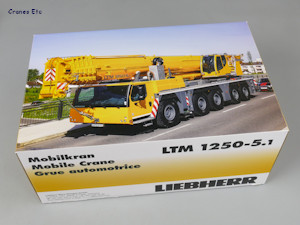 |
| Liebherr-style
box. |
 |
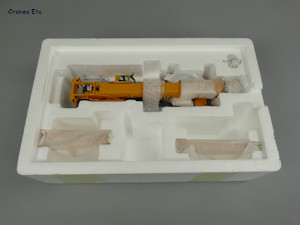 |
| The bottom tray
has the crane and some fly jib pieces. |
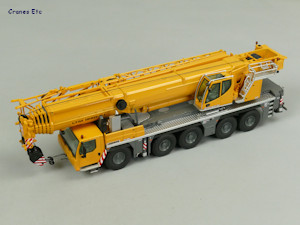 |
| On the road. |
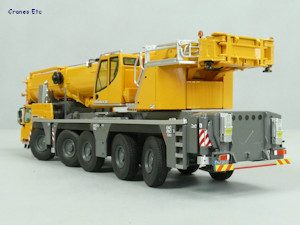 |
| Steering angles
are good. |
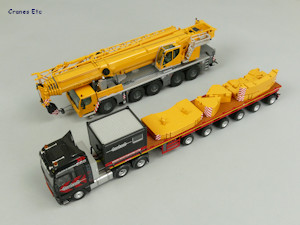 |
| Poses well with
a ballast truck. |
|
|
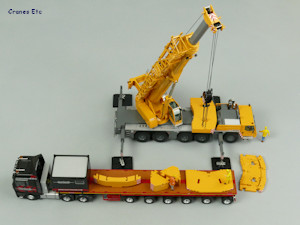 |
| Loading up. |
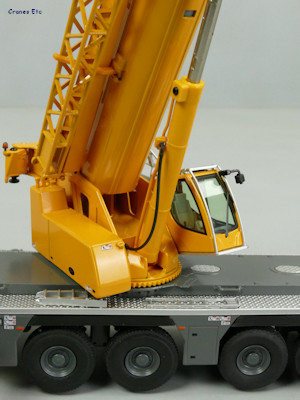 |
| Boom ram has a
plastic jacket with nice detailing. |
 |
| VarioBallast
set with ballast positioned out. |
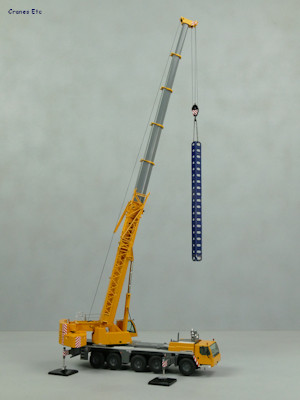 |
| Lifting a
column. |
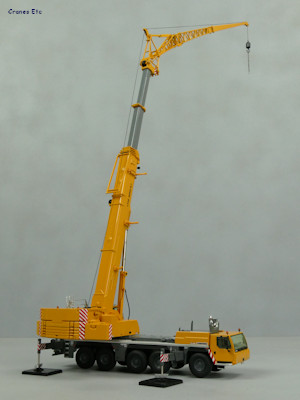 |
| Fly jib set at
an offset angle. |
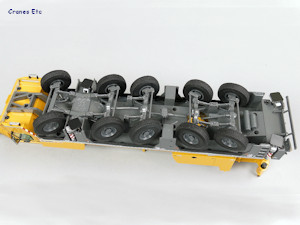 |
| Detailed
chassis. |
|

The Liebherr LTM 1250-5.1 Mobile Crane is a 5-axle crane
with a maximum capacity of 250 tonnes.
Packaging
The model comes in a Liebherr-styled box, and the model
is securely contained within two expanded polystyrene trays.
It is very protected well in the box with most parts wrapped
in soft paper.
There were no defects or missing parts on the review
model.
A coloured instruction manual is provided, and this is in
German and English. This describes the assembly and
most of the features of the model. It has a parts
list and reeving diagrams, and assembly is straightforward
although it can be tricky installing nuts and bolts in some
locations.
There is no information about the real crane.
Detail
The model is heavy, and the chassis has the transmission
detailed although the drive shafts do not join adjacent
axles. There are tanks modelled also. The wheels
have nice tyres and the wheel hubs vary for driven and non-driven
axles.
The outrigger beams are two-stage metal, with very good
details within the casting. The outrigger pistons
are smooth and look realistic, with pads which on the bottom. The
pads have a pinning system so they can be adjusted for transport
and operational modes.
At the front, the driving cab has decent details although
the hitch at the front for tying on a hook block is solid
making it more difficult to pose the model with a hook in
transport mode. Behind the cab, there is a good exhaust
arrangement and other equipment, and tiny graphics give
the model a realistic look. Textured surfaces cover
most of the carrier, and a nice touch is the soft rubber
skirts that sit above the wheel arches.
The crane body sits on a large toothed slewing ring and the
operator's cab is nicely modelled with the mirror and
grab rails being plastic.
The crane body is simple reflecting the real crane, and
the fact that it is a single engine machine.
The hand rails are metal and there are small beacon lights
on the Varioballast tabs.
The counterweight is complex being made up of a number of
different metal plates and parts, each with usable lifting
lugs. One piece has the Liebherr name embossed
on it, and there are sharp chevron graphics applied.
The main boom ram has a plastic jacket with an excellent
colour match and some hydraulics detailing.
The boom has some nice detailing and at the boom head
axles act as connection points for the fly jib and this
represents the fixing points of the real crane. However they
are loose and can go out of position sideways easily.
The telescope sections are engineered very well and they
have very realistic looking collars at the top of each section.
The fly jib comes in three parts and each one is metal.
They are nicely modelled and they connect with tiny brass
nuts and bolts for which tools are supplied.
All sheaves on the model are metal.
Two hooks are supplied. One is a single line block
and the other is multi sheave for heavy lifting. They
are very nicely made.
Features
Each axle on the carrier can be independently steered to
a good angle and so any of the steering modes of the real
crane can be reproduced. They also have working suspension
which provides a good range of movement on each wheel. However,
on the review model the rear end seemed to sit a little
high.
The outriggers pull out, and the pistons screw down. The
range of travel is such that to support the model wheels-free
spreader plates are required and it would have been nicer
if a set was included with the model.
The crane rotates well although it is on the stiff side.
The counterweight system is excellent and replicates the
VarioBallast system of the real crane. During self-ballasting
the counterweight can be placed in two positions on the
carrier deck and small moving plastic markers indicate the
inner position. Moving tabs on the crane allow
the counterweight to be fixed in an inner position where
space is tight, or the outer position for maximum capacity.
Attaching the counterweight is done by screwing down and
interlocking two rams, which can then be screwed back up
to raise the counterweight. Different configurations
of counterweight can be displayed but part loads of plates
can only be hung by careful balancing.
The boom ram has some stiffness but it also has a locking
system using a grub screw and key. It appears that
is designed to be operated only at certain extensions as
the piston has indentations. It all works well enough
but is not as good as systems with metal jackets.
The boom has three locking points on each telescopic section.
The fly jib can be carried on the side of the boom or attached
to the boom head. It has a ratchet system allowing
two offset angles to be set in addition to straight.
The operator's cab can tilt.
Quality
This a heavy and well made model by NZG, with a high metal
content
The paintwork is nice and the applied graphics are very
sharp.
Price
It is fully priced.
Overall
It is good to see that Liebherr has trusted NZG with another
crane model, and it has been well executed. It really
deserves to have some spreader plates included and a proper
tying-on point at the driving cab would make the model easier
to pose in transport mode. Nevertheless it is a well presented
high quality model.
Footnotes
The model first appeared in prototype at the Nuremberg Toy
Fair in 2017.
|
|
|
|
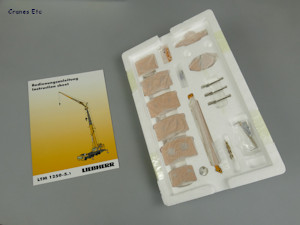 |
| The top tray includes
the counterweight and other parts. A nice manual is included. |
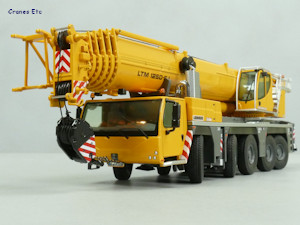 |
| The hook is tied
on in an improvised way. |
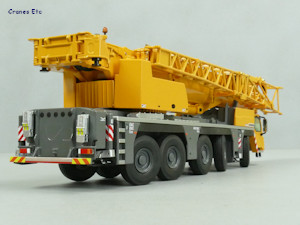 |
| Tiny graphics give
a detailed appearance. |
 |
| Self-ballasting.
|
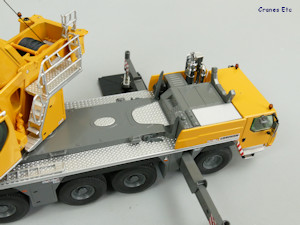 |
| Nice carrier
detailing. |
|
|
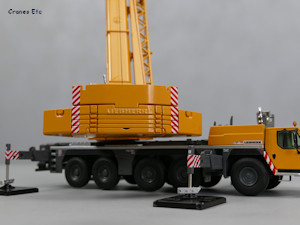 |
| Complex
counterweight. The spreader plates are NZG #787 and are
not included with the model. |
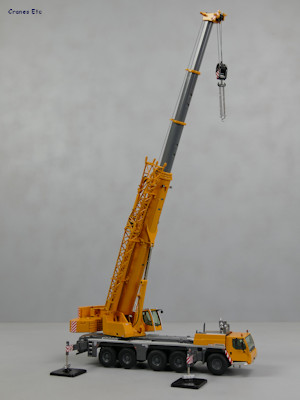 |
| Ready to work. |
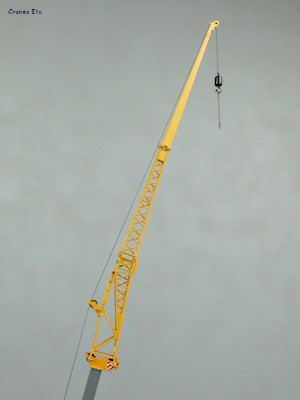 |
| Fly jib is
metal. |
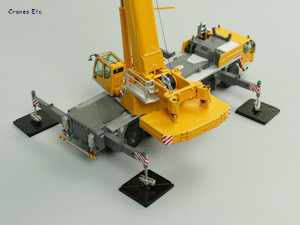 |
| It can be posed
with reduced ballast. |
|

